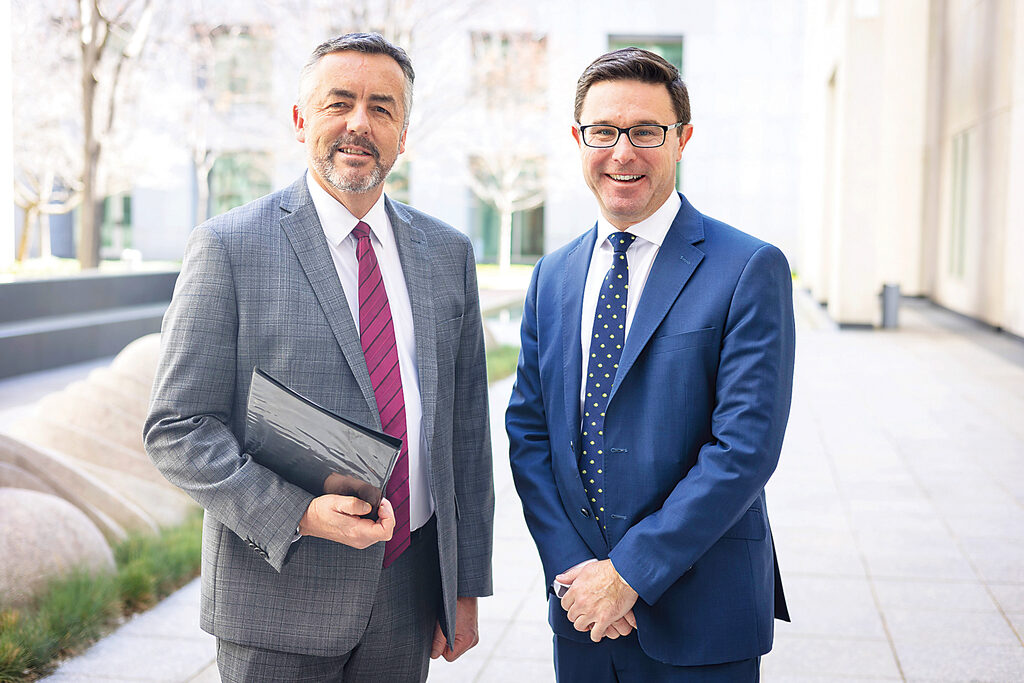BY DAVID BRAITHWAITE
FEDERAL Member for Gippsland, Darren Chester says the break down of the Liberal-National coalition does not change his commitment to “fight for the future of Gippslanders”.
Unable to get agreement with the Liberal Party in four key policy areas, the leadership of the Nationals last week announced they would not renew their coalition arrangement.
The parties have since reneged, and it appears a Coalition fix is in sight (at time of press, Monday, May 26).
If the two parties remain separate, it will means both will be able to form their own policies, and, if they don’t reform a coalition, run candidates at elections against sitting members from the other party. The Liberals would also sit alone in forming the official opposition, with no Nationals in the shadow ministry.
“During the last term of parliament, the Nationals fought hard for a package of sensible and important policies that will benefit regional Australia and the future of our nation. These were adopted as coalition policies and were strongly supported by local communities,” federal Nationals leader, David Littleproud said on Tuesday, May 20.
“Following discussions with the leader of the Liberal Party, we do not have the assurance we need that these policies will be honoured in a future coalition agreement. The Nationals cannot in good conscience walk away from our commitments to regional Australia.” The Nationals could not get guaranteed support from the Liberals for the the $20 billion Regional Australia Future Fund, ‘big stick’ divestiture competition laws to “keep the big supermarkets honest and deliver fairer prices for farmers at the farmgate and families at the checkout”, improved universal service obligation for regional mobile and internet access, and the potential of nuclear power to be added Australia’s energy mix.
“The Nationals’ Party Room does not take this decision lightly. It is made without malice. When the Liberal Party is ready, our door will be open,” Mr Littleproud said.
“We will always stand up for regional Australians and the policies that will take our nation forward.”
The Nationals retained the 15 lower house seats they took into the recent election, but saw a Senator not re-elected and Jacinta Nampijinpa Price move to the Liberal partyroom after the election.
Mr Chester said the Liberals needed time to evaluate the loss of their 15 lower house seats, while allowing his party to undertake additional policy work.
Because they’ve had more MPs, the Liberals have been the senior partner of the coalition, and held most of the key positions, such as, when in government, Prime Minister, treasurer and foreign affairs. Nationals MPs have traditionally held the agriculture and transport portfolios.
In the most recent parliament, Mr Chester held the shadow ministries for regional education and regional development, local government and education. Among the ministries Mr Chester had when in government were veterans’ affairs, transport and infrastructure and regional development.
If no longer a shadow minister, Mr Chester would stand to lose almost $60,000 from this annual salary. Don’t worry, he’s still be getting a base MP salary of $233,643.
Mr Chester said he would would be doing everything he could to hold the Labor government to account in the interests of regional Australians.
“Sadly, our nation is more divided in geographic terms than ever before, with the Labor Party dominating the metropolitan areas and showing no regard for the issues in rural, regional and remote areas like Gippsland. I will be doing everything I can to fight for a fair share of resources for regional roads, community infrastructure and critical services in health, aged care, childcare and disability services,” he said.
“Whether it’s part of a coalition or as a stand-alone party, my commitment is to keep working for the benefit of Gippslanders and securing the infrastructure and critical services we need for the future.
“It’s critical that we focus on the people who trusted us to represent them and bring forward a positive policy agenda to build a safer, stronger and fairer regional Australia.”
Monash University School of Social Sciences head of politics, Dr Zareh Ghazarian said the dissolution of the coalition agreement was going to potentially liberate both parties. “To examine the decision we need to be looking at how the parties performed at the election. The Nationals held ground generally, while the Liberals went backwards,” he said.
“So the Nationals are probably feeling a bit emboldened that they have got the constituency behind them,” Dr Ghararian said.
“The Liberals, on the other hand, are really struggling, so this will give them some time to recalibrate as they move towards the future.
“There is a fundamental difference over policy at the moment, with the Liberal Party having conservative elements and socially progressive elements. How they reconcile the difference between the conservatives and progressives is part of the problem for them to face going forward.”
There are cases at state level when the two parties have not been in a formal coalition, such as currently in Western Australia.
In Victoria, the Nationals, under the leadership of then member for Gippsland South Peter Ryan, contested the 2002 and 2006 elections separately from the Liberals, which saw an increase of two lower house members.
The Victorian coalition agreement was renewed in 2008 before the parties ended Labor’s 11-year run in government in 2010. The coalition arrangement has been maintained, despite losing each election since 2014.












